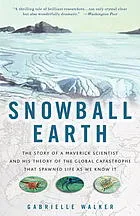Snowball Earth : the story of the great global catastrophe that spawned life as we know it
4.5
Reviews from our users

You Can Ask your questions from this book's AI after Login
Each download or ask from book AI costs 2 points. To earn more free points, please visit the Points Guide Page and complete some valuable actions.Introduction
Welcome to the fascinating story of one of Earth's most extraordinary chapters—an ancient global catastrophe that forever shaped the destiny of life on our planet. In Snowball Earth: The Story of the Great Global Catastrophe that Spawned Life as We Know It, Gabrielle Walker takes readers on an enthralling journey through time, unraveling the mystery of a planet locked in ice and the profound implications it had for evolution. This breathtaking account seamlessly blends science, history, and vivid storytelling to shed light on one of the most extreme geophysical events in Earth's history, known as the "Snowball Earth" hypothesis.
The book provides a compelling exploration of how a severe ice age, millions of years ago, froze Earth from pole to equator, creating unimaginable hardships for life on our planet. Astonishingly, this cataclysmic event also paved the way for the explosion of complex life forms—life as we know it today. With meticulous detail, Walker introduces readers to the scientists behind the discovery, outlines the debates surrounding the hypothesis, and reveals how this ancient freeze profoundly shaped Earth's biological and geological future.
Let’s dive into the key aspects of the book through a comprehensive summary, essential takeaways, memorable quotes, and an exploration of its significance.
Detailed Summary of the Book
In Snowball Earth, Gabrielle Walker recounts the remarkable scientific journey of uncovering Earth's most extreme ice age. The book centers around the Snowball Earth hypothesis, a theory that suggests Earth's surface was entirely or almost entirely frozen over during several periods in the Proterozoic Eon, more than 600 million years ago. Walker begins by setting the stage, introducing the reader to Earth's early history and the geological context in which these events unfolded.
She skillfully weaves together the narratives of pioneering scientists like Paul Hoffman, whose groundbreaking work in the field of paleoclimatology brought the Snowball Earth theory into the scientific spotlight. Walker explains how evidence, such as glacial deposits found in tropical rock formations, supports the idea of a frozen Earth. She also delves into the complex mechanisms of global-scale ice ages, exploring the interactions between volcanic activity, greenhouse gases, and Earth's position in the solar system.
However, the story of Snowball Earth is not just a tale of calamity. Walker paints a vivid picture of how life, existing in extreme environments like subglacial oceans and hydrothermal vents, not only survived but adapted and thrived. In her narrative, Walker shows us how such challenging conditions could have acted as a crucible for innovation, leading to the evolution of multicellular organisms. This pivotal moment, she suggests, set the stage for the Cambrian explosion of life approximately 541 million years ago.
The prose flows effortlessly between meticulous scientific detail and moments of poetic reflection, making complex concepts accessible to readers without oversimplifying them. This engaging narrative illuminates the beauty, fragility, and resilience of life on Earth.
Key Takeaways
- The "Snowball Earth" hypothesis underscores the interconnectedness of Earth's climate systems, geology, and biology.
- Extreme environments can catalyze evolutionary leaps, challenging life to adapt and innovate in previously unthinkable ways.
- Scientific discovery is an iterative and collaborative process, fraught with debate and breakthroughs.
- Earth's history is a testament to its resilience, with life continually adapting to even the harshest conditions.
- The Snowball Earth stories encourage us to reflect on current environmental challenges, offering lessons on the consequences of climatic shifts.
Famous Quotes from the Book
"Earth froze over, completely—pole to equator, a planet locked in ice. And yet, life persisted, subdued but not silenced, finding refuges in the darkest corners of the planet."
"Adversity is often the birthplace of innovation. The great freeze not only tested life on Earth but also allowed it to emerge stronger, more diverse, and more complex than ever before."
"Snowball Earth challenges our understanding of catastrophe. Sometimes, destruction is not the end but the beginning."
"The rocks whisper stories of ages past, tales of ice and fire, and the improbable journey of life as it clings onward."
Why This Book Matters
Snowball Earth is not merely an account of Earth's ancient history—it is an exploration of resilience, adaptability, and the profound forces that shape life. Gabrielle Walker’s narrative is timeless, echoing lessons about climate change, evolution, and our planet's fragility. The book reminds us how delicate the balance of Earth's systems truly is and offers insights into the challenges humanity faces amidst ongoing environmental changes.
For anyone fascinated by Earth science, history, or the origins of life, Snowball Earth is an illuminating and thought-provoking read. It bridges the divide between science and storytelling, offering a sense of wonder about our planet's past and an invitation to consider our role in shaping its future.
By understanding Snowball Earth, we gain not only a clearer picture of Earth's past but also invaluable context to navigate the challenges of its present and future.
Free Direct Download
Get Free Access to Download this and other Thousands of Books (Join Now)
For read this book you need PDF Reader Software like Foxit Reader


